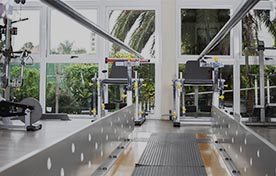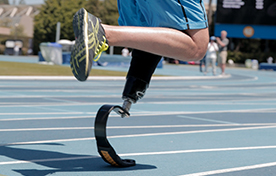Special Problems and Needs of Older Amputees
Everyday living can change when a person gets older. Tasks that were once easy can become hard, such as talking, walking, driving, cooking or remembering information. People with disabilities may find it especially hard to cope with getting older.
The majority of amputees are over age 65. Many of them have lost a limb due to an illness such as diabetes or vascular disease, which affects older adults more often than younger ones. Seniors face many of the same problems, regardless of disability, but having a disability can make these years a little more challenging.
Financial Problems
Financial problems affect many older Americans. Over 10 percent of senior citizens live below the federal poverty level. Retirement savings might drop due to the stock market. People living on fixed incomes struggle with unexpected costs such as amputation Special Problems and Needs of Older Amputees surgery, a prosthesis or rehabilitation. Many financial costs are due to lack of complete insurance coverage. Seniors often need the most medical attention, and those costs are rising. Financial stress can lead to additional problems.
Seniors are using credit cards more often and with less care than adults ages 18 to 34.
Seniors who are struggling with money are sometimes more desperate and can be taken advantage of by scams and con artists.
Money problems make it harder for seniors to recover when they are released from the hospital.
Loneliness Older people can become lonely for many reasons. A person might become lonely if a spouse passes away. Others may not have family or friends nearby. Studies show that a person with poor eyesight or hearing can become lonely because they can’t take part as easily in conversation and daily life. Other research shows that when people become lonely they’re more likely to:
- Think they are unhealthy
- Become depressed
- Visit the doctor more often
Hearing and Vision
As people get older, their hearing and vision may decline. This can cause problems with loneliness as mentioned above. It can also lead to serious medical issues.
Hearing problems make it hard to get instructions from healthcare workers. If doctors and nurses are unclear, don’t speak loud enough or don’t write out important details, it can result in missing important health information. Not every senior has a caregiver who can be “the ears” for seniors with impaired hearing.
Vision problems can range from blurriness to complete blindness. People with diabetes are at higher risk for developing vision problems. Seniors with poor eyesight may not be able to read the small print on prescription labels and over-thecounter products. Magnifying glasses can help, and pharmacists may be able to make prescription labels in large print. Otherwise, healthcare workers and caregivers must read the medication information.
Multiple Medications
A common problem for seniors and many people with disabilities is polypharmacy (using more than one medication at one time). The more medications a person takes, the greater the risk of experiencing a medicationrelated problem. It can be hard to keep all of the prescriptions filled, especially during weekends and holidays. It can also be hard to manage medications prescribed by more than one doctor. Caregivers must ask questions about each medication, such as:
- Is this medication really needed?
- Will the medication be a problem with other medical conditions?
- Is the medication being prescribed at the right dose?
- Does the medication interact with other medications?
- Can the medication be taken correctly based on specific patient circumstances?
Lack of Support
Support can come from family, neighbors, church members, volunteers or paid caregivers. Unfortunately, the quantity and quality of support services for seniors isn’t the same for everyone. But even a strong network of social support is helped by having community and government programs. Some types of programs include:
Meals on Wheels – This program is volunteer-run and provides hot meals to people who are physically unable to prepare their own meals and don’t have anyone else to cook for them.
Friendly Visiting – Volunteers will either call or visit someone in the home. One benefit is to build friendships, which helps to prevent loneliness. Perhaps more importantly, a friendly visitor can identify a person’s needs and notify those who can help.
Adult Day Care – These centers are a good place for seniors to get out of the house and interact with others. They can provide mental and physical stimulation and give caregivers a break
Lack of Physical Mobility and Transportation
People lose bone density, muscle mass and strength as they get older. This can lead to balance problems, which is why so many seniors fall and get injured. Amputees know how important balance is to preventing injury. People with lower-extremity prostheses have to work harder than others to walk and stand without falling. Wheelchair users also struggle to move around at home and in public places. It can be hard to fit through some doorways, maneuver in a restroom stall or find ramps instead of stairs. People who don’t have electric wheelchairs know how tiring it can be to use their arms to wheel around. Because of these barriers, seniors with physical challenges tend to stay home more often.
Two-thirds of seniors who stop driving say it’s because of physical problems. Once seniors stop driving, they can become very dependent on others. If they don’t receive support, they may become isolated from friends, social services and their communities. While it can be harder for them to get around, it is important that they do quit driving if they are becoming dangerous. Seniors have the highest car-crash death rates per mile of all drivers except teenagers. If family and friends aren’t available to drive them, then they must rely on escort services and public transportation.
Aging Skin
Aging skin is natural. As people get older, their skin becomes thinner. It can be more difficult for older amputees to maintain healthy skin when it’s often in contact with a prosthesis. Skin breakdown can include blisters, rashes and tears that can become wounds.
When aging skin gets a sore from a prosthesis, it can take a long time to heal. Aging skin contains less moisture and collagen, both of which help to repair wounds. With all of the problems that older amputees face, it is very important that individuals work together with their families or caregivers to get good medical attention and support services. Seniors can do some things to improve the quality of their lives, such as eating a healthy diet and getting exercise. But even this will not be enough if seniors who need help don’t receive it in time
Disclaimer: The following information is provided and owned by the Amputation Coalition of America and was previously published on the website http://www.amputee-coalition.org or the Coalitions Newsletter, inMotion.








